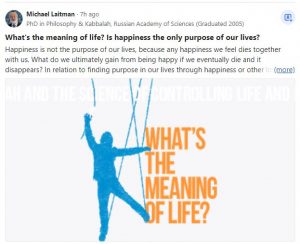
Happiness is not the purpose of our lives, because any happiness we feel dies together with us. What do we ultimately gain from being happy if we eventually die and it disappears?
In relation to finding purpose in our lives through happiness or other lofty sensations in our world, such as freedom, love and success, the wisdom of Kabbalah describes the concept of Pharaoh—an egoistic and materialistic ruler who considered happiness and other worldly pleasures as life’s purpose, and thought that they would follow him to his grave. However, no happiness we achieve in this life continues afterward, and we would thus be wise to set our sights on a purpose that is everlasting and eternal.
What is an everlasting and eternal purpose to life?
It is only existent in our spirit, above our body, beyond everything we currently know and feel through our five senses. If we attain contact with such a higher sphere, we then attain the purpose of our lives. Moreover, we can do so while being alive in our current body.
The attainment of the perception and sensation of this higher sphere—”higher” meaning above what our corporeal mind and feelings can grasp—that governs us gives us a complete perception and understanding of where we come from, where we are headed, what and who we are, what created us, as well as how we were created and why.
Moreover, by attaining this higher sphere, we also discover true and everlasting happiness. However, such happiness is not life’s purpose in and of itself, but rather comes as a byproduct of attaining the purpose of our lives, which is the attainment of the eternal reality.
Featured in Quora